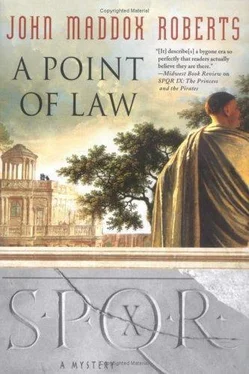John Roberts - A Point of Law
Здесь есть возможность читать онлайн «John Roberts - A Point of Law» весь текст электронной книги совершенно бесплатно (целиком полную версию без сокращений). В некоторых случаях можно слушать аудио, скачать через торрент в формате fb2 и присутствует краткое содержание. Год выпуска: 0101, ISBN: 0101, Издательство: St. Martin, Жанр: Исторический детектив, на английском языке. Описание произведения, (предисловие) а так же отзывы посетителей доступны на портале библиотеки ЛибКат.
- Название:A Point of Law
- Автор:
- Издательство:St. Martin
- Жанр:
- Год:0101
- ISBN:9780312337254
- Рейтинг книги:5 / 5. Голосов: 1
-
Избранное:Добавить в избранное
- Отзывы:
-
Ваша оценка:
- 100
- 1
- 2
- 3
- 4
- 5
A Point of Law: краткое содержание, описание и аннотация
Предлагаем к чтению аннотацию, описание, краткое содержание или предисловие (зависит от того, что написал сам автор книги «A Point of Law»). Если вы не нашли необходимую информацию о книге — напишите в комментариях, мы постараемся отыскать её.
A Point of Law — читать онлайн бесплатно полную книгу (весь текст) целиком
Ниже представлен текст книги, разбитый по страницам. Система сохранения места последней прочитанной страницы, позволяет с удобством читать онлайн бесплатно книгу «A Point of Law», без необходимости каждый раз заново искать на чём Вы остановились. Поставьте закладку, и сможете в любой момент перейти на страницу, на которой закончили чтение.
Интервал:
Закладка:
“Actually,” I said, “it isn’t so easy to conquer a new province, and the Senate will see to its administration.”
“The Senate? The Senate names provincial governors! They don’t do any work! You know that; you’re a senator yourself. We have to provide the record keepers, keep the correspondence moving between the provinces and Rome, and build another level of rooms for this place so we can store them all. And do you think the Senate is going to vote us the budget to take care of all this? Hah!”
Hermes stepped forward and took a pouch from within his tunic. When he shook it, it made a musical jingle.
“Well, what is it you want?” Androcles asked, now marginally less hostile.
“I need documents pertaining to the citizenship status of the Tribune of the People Manilius, soon to leave office.”
His eyes went wide. “Find documents pertaining to one citizen among all this-”
“Oh, shut up,” Hermes said. As a freedman himself he knew all the poses and dodges. “You know perfectly well that you got all that stuff together when Manilius declared himself a candidate. And I happen to know that you keep the records pertaining to all serving magistrates handy because every climbing politician who wants to sue one of them for malfeasance comes here and bribes you for a look at them, just like we’re doing. So go get them now.”
Androcles glared at him. “I don’t have to take that from some jumped-up errand boy! I remember when you carried the Senator’s scraper and bath oil, and he was ill-advised to entrust you with those.”
I placed an arm around his shoulders. “My friend Androcles, I know how overworked you are, and I, for one, appreciate the toil and stress of your office. Now, as one servant of the Senate and People to another, could you see if you can find these things for me?”
“Well,” he said, somewhat mollified, “let me see what’s to be found.” He stalked off between two stacks of shelves, calling for his slave assistants.
“Always the politician, eh?” Hermes said.
“He’s a voter, too, Hermes. Never forget that.”
A slave appeared a short time later, holding an armload of scrolls and tablets. “Where do you want these?”
I pointed to one of the tables beneath the latticed windows that lined one of the long, southeast-facing walls. He arranged them neatly and stood back, not letting the documents out of his sight. We began to go over them.
“Publius Manilius Scrofa,” Hermes read, “is a native of Rome, born in the Via Sacra district. He is a plebeian of the rural Pinarian Tribe, enrolled in an Equestrian Century. He is twenty-eight years old, unmarried, and has no children.”
He read this from the document Manilius filed when he declared himself a candidate. It told me little. He had to be plebeian or he couldn’t be a tribune. Nobody who wasn’t equestrian could afford public office. All citizens belonged to tribes, and old, respected families always belonged to rural tribes and thought the urban tribes were all riffraff. Via Sacra might put him in Clodius’s old camp-he’d been a great hero in the Via Sacra-but not necessarily.
I picked up a document from the last censorship, five years previously. It affirmed that Manilius qualified for the equestrian order, possessing a fortune of 415,000 sesterces. I showed this to Hermes.
“Just over the line for an eques ,” he noted. “That’s not much to finance a political career.”
“I wonder how his fortune would assess now. A tribune is in a position to make himself rich during his year in office.”
“Maybe his father died and he inherited,” Hermes pointed out. “Or he could have borrowed. The censors’ assessment is on property. It doesn’t take debt into account. A lot of cash-poor candidates borrow heavily rather than sell their lands and buildings.”
“Very true,” I said. “But I can’t think of any way we can find out. There is no law requiring anyone to disclose the nature of his finances.” I pondered this for a moment. “But, to maintain equestrian status, he had to file a list of his landed properties. Let’s see what’s here. It could tell us something.”
We rummaged through the documents until we found a property statement filed with the electoral board that regulated the status of candidates between censorships. The previous year Manilius had listed the same property as during the last censorship, plus a new cash income of one hundred and twenty thousand sesterces per annum from an estate he hadn’t possessed then.
“Well, well,” I said. “It seems that young Manilius has come into possession of a fine estate in-guess where.”
“Baiae?” Hermes answered.
“Where else? Ever since this business started, all roads lead to Baiae.”
“Pretty substantial estate, too,” Hermes observed, going down the list of its assets. “Two hundred iugera of land, divided into plowland, pasture, orchards, and vineyards, as well as a villa with colonnades and formal garden, olive press, wine press, ninety slaves, and twenty tenant families. Plus, it’s right on the bay and has its own permanent, stone wharf.”
“Not quite princely but very substantial,” I noted. “It would be nice to know who owned it before it came into his possession.”
“They’re all Pompey’s clients in the south, aren’t they?” Hermes asked.
“Not everyone. And Baiae’s become so popular that it’s practically neutral ground.”
The beautiful little town on the Bay of Neapolis at the southern end of Campania had become the most fashionable resort in Italy. During the hottest months, when Rome became intolerable, most wealthy families abandoned the capital for their country estates. Those who could afford it bought a villa in Baiae as a summer retreat. Cicero had one. So did Lucullus, Pompey, and many others. If you couldn’t afford a place there, you tried to cadge an invitation.
“Too bad we don’t have a few more days to work on this,” Hermes said. “We could go down to Baiae and find out who gave him the estate. It’d be a good excuse for a trip to Baiae, anyway.”
“We shouldn’t have to go that far.”
“Oh? You have a plan?”
“Always. I think we should go call on Caius Claudius Marcellus, brother of our consul and most likely consul for next year.”
The city was beginning to get noisy. The soldiers were pouring in through the gates, flooding the taverns, and beginning to spread their money around. The day had turned into an impromptu holiday. Nobody seemed concerned that I was still running around loose.
The house of the Claudia Marcelli was well up on the Palatine. It was actually a veritable compound, holding the houses of a number of prominent members of that family. By asking, I found the proper door and announced myself. I was conducted into the atrium of a house that was fine but not pretentiously so, with a display of death masks that seemed to go back to the Tarquins. Romans who could boast such ancestry felt little need for greater display. The wealth of a Crassus could not buy lineage like that.
After a short wait, a lady came into the atrium to greet me.
“Welcome, Senator Metellus. I fear that my husband cannot be here to give you a proper greeting.” She appeared to be in her early twenties and was therefore far younger than her husband. Nothing unusual about that. Patrician girls were often married off at fifteen or sixteen to politicians in their fifties. She was beautiful in a rather severe way, with hard-planed, regular features. Her clothing was of fine make but proper and old-fashioned. She was as far from Fulvia as she could be and still be Roman.
“What could be more proper than a greeting from the distinguished Lady Octavia?”
“You are diplomatic, but then that is the reputation of your family. My husband is out with the rest of the Senate inspecting my great-uncle’s horde.”
Читать дальшеИнтервал:
Закладка:
Похожие книги на «A Point of Law»
Представляем Вашему вниманию похожие книги на «A Point of Law» списком для выбора. Мы отобрали схожую по названию и смыслу литературу в надежде предоставить читателям больше вариантов отыскать новые, интересные, ещё непрочитанные произведения.
Обсуждение, отзывы о книге «A Point of Law» и просто собственные мнения читателей. Оставьте ваши комментарии, напишите, что Вы думаете о произведении, его смысле или главных героях. Укажите что конкретно понравилось, а что нет, и почему Вы так считаете.









